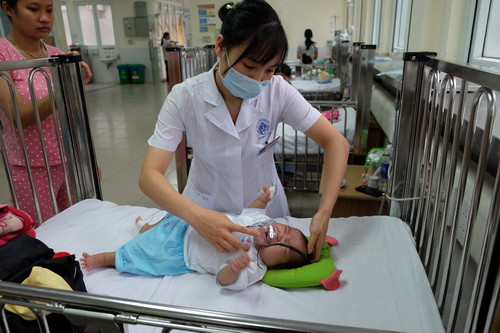Caring for children with asthma in cold weather
In the cold and humid weather, respiratory diseases in children increase, including asthma. Bronchial asthma is the most common chronic respiratory disease in children. The disease needs to be controlled promptly to avoid dangerous complications.
Risk factors for asthma
Asthma is not a contagious or infectious disease. Asthma is common in children. The rate of children with asthma is also twice as high as that of adults (10% compared to 5%). However, in reality, the diagnosis of asthma in children is often delayed, especially in children under 2 years old. This inevitably limits the effectiveness of treatment: children often have attacks, have to be hospitalized, and can even die.
There are many favorable factors or main causes of asthma, such as:
Genetics, family factors:Genetic factors in asthma are very large. People with asthma can be due to genetics, in the family there are also people with allergies such as hives, itching, weather allergies, seasonal allergic rhinitis, especially if the father, mother or both have asthma, the rate of children with asthma is also high.
Constitutional factors:Many cases of asthma in children are due to genetics. Approximately 30-60% of children with eczema may later develop asthma. Children with allergic rhinitis, bronchial asthma, and hypersecretory constitutions are also more likely to develop asthma.
Exposure to allergens:Allergens such as dust, dog and cat hair, pollen, kitchen smoke, cigarette smoke, erratic weather changes, cold (cold season often causes asthma relapse in people with chronic asthma). The use of some medications (Eastern and Western medicine) also has side effects that trigger asthma attacks. Microorganisms in the air (bacteria, viruses, molds). Nowadays, people also mention a lot about the role of mold, which can also be one of the risk factors for asthma or asthma relapse.
Food use:Some foods are also mentioned in the risk of causing asthma recurrence such as: shrimp, crab, snail, frog...
 |
| Caring for children with asthma at the National Children's Hospital. |
How to detect the disease?
To know if a child has asthma, the diagnosis is often easy when the child is having an attack: the child coughs, feels heavy in the chest, wheezes, has difficulty breathing (rapid breathing, chest retraction, neck muscle retraction, nostrils flaring,...). However, the diagnosis is not always easy.
Children should be suspected of having asthma when they have recurring coughs (especially at night), wheezing, and difficulty breathing that appear or worsen when they are exposed to triggers (when the weather changes, when they exert themselves, or when they "eat" certain foods, etc.). While wheezing and difficulty breathing are quite typical suggestions, recurring coughs are quite special symptoms but are often overlooked, because people think children are prone to transient coughs... In children under 2 years old, asthma should be considered when the child has recurring wheezing 3 times in a row, even when no one in the family has asthma or allergies. In fact, sometimes children with asthma only show symptoms of coughing at night (sometimes so much that they cannot sleep) without any other suggestive symptoms and the child is completely normal during the day. Some experts often call this “cough-variant asthma” - a rather special form of the disease and often overlooked.
How to diagnose when a child does not have seizures or when the child has atypical manifestations?
Spirometry is an inexpensive test that can help diagnose asthma when asthma is suspected, when the patient is not having an attack, or when there are atypical, unclear symptoms that some physicians call “masked asthma”. However, this is an exercise test that requires patient cooperation, so it is often difficult to perform on children under 6 years old.
Proper care to reduce symptoms
The most important thing to prevent acute asthma attacks and reduce asthma symptoms in children is to avoid the causes that can trigger asthma attacks: do not keep pets (dogs, cats, etc.) in the house, regularly kill cockroaches. Do not smoke in the house and near children. Do not leave strong-smelling substances (detergents) in the house. Avoid using sprays such as air fresheners, mosquito and insect sprays. Limit children's exposure to incense smoke.
Child's sleeping place:The bedroom should be kept clean and tidy, and no carpets should be used. Regularly wash bed sheets and blankets in hot water and dry them in the sun. Do not let children play with stuffed animals or allow animals into the sleeping area.
Use windows (open or closed) to maintain clean and fresh air. Children should play outdoors in well-ventilated areas every day.
Children should be limited in eating foods that can easily cause allergies and trigger asthma attacks such as seafood, crabs, snails, wild game meat, etc.
Parents and caregivers should note that when children show signs of asthma or are suspected of having asthma, they should be taken to a respiratory specialist for proper diagnosis and treatment. It is necessary to strictly follow the doctor's instructions, return for follow-up appointments on time, and never stop taking medication on your own, even if the child seems to be better.




